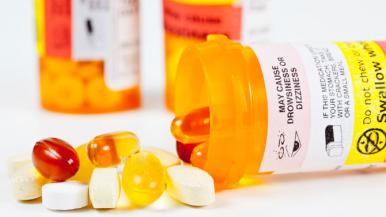Medications can help ease pains and cure diseases. But sometimes, mixing medications with other drugs, foods or supplements can result in unwanted side effects.
Sometimes, the interactions make the medications more potent, and other times less. Occasionally, these changes can be life threatening. Knowing about potential interactions — and how to prevent them — can keep you and your family safe.
What you need to know*
1. In some cases, taking two medications together can change how the drugs work.
For instance, simultaneously taking an aspirin to minimize blood clotting along with a non-steroidal anti-inflammatory drug (e.g., ibuprofen) for inflammation can reduce the aspirin's effectiveness.
2. Certain foods or beverages can increase or reduce a drug's effectiveness.
For example, grapefruit juice acts on an enzyme responsible for breaking down cholesterol-lowering statins. This makes the statins too strong and can increase potential side effects, ranging from joint pain to kidney failure.
And be aware that some medications — like beta blockers — work more steadily with a full stomach while others work best on an empty stomach. Check your labels before your first dose.
Here are some common food/medication combinations to avoid:
- Grapefruit juice and statins
- Dairy and certain antibiotics
- Leafy greens and blood thinners
- Natural black licorice and certain heart and blood pressure medications
- Chocolate, processed meats or aged cheese and MAOI inhibitors
3. Sometimes, a medication for one condition can make another condition worse.
For instance, some antidepressants, like amitriptyline, can affect your heart rate.
4. Certain over-the-counter medications are more likely to cause interactions.
Note that these types of medications often have drug interaction warnings:
- Antacids
- Antihistamines
- Laxatives
- Decongestants
- Nicotine replacements
- Pain relievers
- Sleep aids
Not only can it make driving dangerous, but sometimes mixing medication with alcohol — such as codeine and alcohol — can lead to coma.
5. Vitamins and herbal supplements can interact with medications.
For instance, studies show that St. John's wort — commonly taken for depression — decreases the effectiveness of several medications, including oral contraceptives.
The best way to get megadoses of vitamins? Eat more fresh fruits and vegetables.
6. Mixing alcohol with medications can be dangerous.
Not only can it make driving dangerous, but sometimes mixing medication with alcohol — such as codeine and alcohol — can lead to coma.
Heart medications and antidepressant should never be mixed with alcohol, either.
Keep yourself safe
Given that so many things can cause potentially harmful interactions, Dunham says it's important to always do the following:
- Read the labels. You will learn what the medication is used for, its active and inactive ingredients (which might interfere with other medications), how to take the medication and how to limit unwanted interactions. Call the phone number on the label if you have other questions.
- Ask your doctor questions. When you get a new prescription or take a new over-the-counter medication, look up information on the Web, then bring in your questions. Your doctor will make sure the information you found online applies to you.
Just make sure to use a reliable source, such as the National Institutes of Health or Centers for Disease Control, since the Internet houses some bad information.
- Talk to your pharmacist. The pharmacist is another great resource who can answer questions on site, before you buy an over-the-counter medication or supplement.
*This is not meant to be a comprehensive list of all potential interactions. Talk to your doctor or pharmacist before starting any new medication (prescription or over-the-counter), vitamin or supplement to make sure it does not interact with anything you are currently taking.




